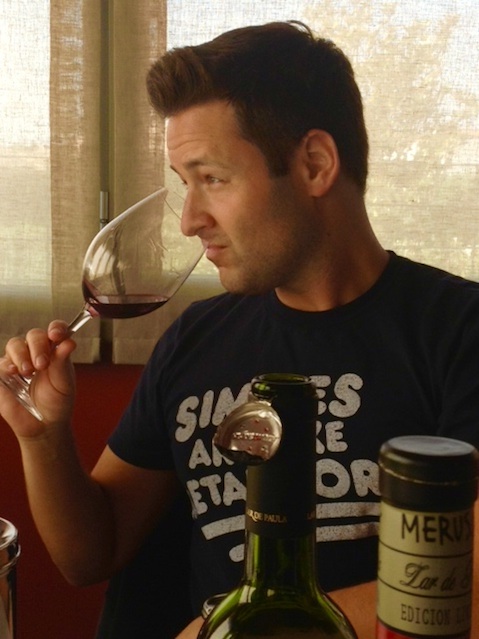The language of wine is descriptive. But there’s description, and then there’s douchery. Douchery is totally a word.
Unfortunately, many delightful words in the English language have been coopted by critics and amateurs alike and repurposed to make them sound smarter as they expound on wine.

Don’t be like Miles and Jack…whatever you do, don’t call a wine “quaffable”!
Don’t get me wrong, I’ve been guilty of using several of these, too, but I’m trying to cut back, and you should too if you want me to go wine tasting with you.
Barrique: Technically, this is a 255-liter oak barrel typical of Bordeaux (so it’s longer and thinner than a Burgundy-style barrel, if anyone’s asking) that you can use to ferment and/or age wine. But you’ll find some snobs using it to refer to any old wine barrel. Just call it a barrel, dude! Unless you’re in Bordeaux talking about an actual barrique. Then I’m cool with it.
Brett: Another abbreviation, this time for brettanomyces. Brettanomyces is a strain of yeast that can throw off funky tastes and odors in a wine often referred to as “barnyardy.” By using the term “brett,” douches are telegraphing two things: first, that they’re familiar enough with a yeast strain to give it a nickname, and second, that their nose is more sensitive than yours à la princess and the yeast.
Diurnal Range: Put simply, this means the temperature range over the course of a day. It matters in terms of growing conditions and other factors like upping a grape’s sugar content or acid balance. But diurnal? It sounds like diuretic, which is not what you want to be thinking about while drinking wine. And you can just as easily express what you want to say with the word “temperature,” so skip the Latin etymology and stick to English.
Flabby: A lot of folks use this word to describe wine that doesn’t have quite enough acidity for their taste. In that it feels fat or fleshy on the palate without a balancing crispness. But wines aren’t Rubenesque cherubs, and you’re not Michelle Obama enlisting them for “Let’s Move!”, so forgo the anthropomorphizing please.
Malo: A shorthand term for malolactic fermentation. This is the process by which malic acid is converted into lactic acid, removing some of the wine’s crispness in favor of a creamier texture and complexity. I get it, you know what malolactic fermentation is and does. But your familiarity with it leads me to believe that you are swilling oaky, buttery, bargain-basement Chardonnay when no one’s looking.
Mouthfeel: This is a common one, and it’s basically exactly what it says – how a wine feels in your mouth. But you wouldn’t say eye-image, nose-odor or ear-sound, so why would you describe a wine’s mouthfeel? Or, at least, if you’re going to describe how it feels in your mouth, just use adjectives and leave out this Teutonic-style compound word that I’m not even sure really exists in the English language. And no matter what, do not say that a wine’s mouthfeel is velvety. Why would you want velvet in your mouth?

This is me. Smelling wine. Like a douche. Don’t be like me.
Nose: I’m all in favor of metonymy as a literary device, but just because you use your nose to sense a smell doesn’t mean you should refer to a wine’s smell – or aroma or bouquet, two terms I vastly prefer – as its nose.
Quaffable: Who are you, Falstaff? There’s no reason anyone except a medieval scribe who’s run out of synonyms for drinking should use the word quaff or any of its derivations these days. By calling a wine quaffable, you not only display your disdain for what you’re being served, but also that you’d rather be at a Renaissance fair. Use it in my presence and I will suggest you quickly drink up and then get the hell out to help Prince Hal win the Battle of Agincourt.
Robust: What are you describing using this word? The strongman at the circus? Theodore Roosevelt’s foreign policy? Using this word basically tells me that you have no better descriptors at your disposal and that all you’re tasting is a hit of alcohol and possibly some fruitiness. Try harder!
Tannic: I’m already puckering my mouth thanks to the tannins in this super-extracted red wine. I don’t need you telling me that it’s tannic. My mouth feels like it’s full of ashes. I get it. I don’t care how long the tannins are going to let this wine age gracefully, I want to get the feeling back in my tongue.
Varietal: Now, don’t jump down my throat on this one. I think you have to use varietal a lot when it comes to wine. The only thing is, you should use it properly, as it was pointed out to me that I was not. Varietal is an adjective and should be used to describe the attributes of a particular variety of grape. Varietal is not, however, a noun. So, for instance, Chardonnay is not a varietal, but a variety. Though a Chardonnay can exhibit varietal characteristics like a golden color or crisp citrus notes. I challenge you to trap your favorite wine douche using this word incorrectly!

